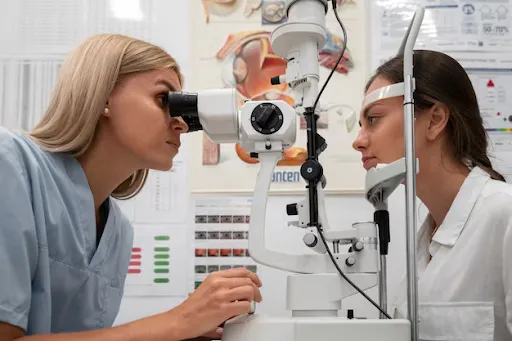Winter Eye Protection
Tips for Protecting Your Eyes in Extreme Winter Conditions
FSDAVCFEBFEVSDDVFSD
FSDAVCFEBFEVSDDVFSD
FSDAVCFEBFEVSDDVFSD
Risks to Eye Health in Winter
Winter can bring several challenges for eye health, including dryness, irritation, and glare from snow. The cold, dry air reduces moisture in the eyes, leading to discomfort and dry eye syndrome. Additionally, the bright reflection from snow or ice can cause snow blindness, while the wind exacerbates irritation by drying out the eyes quickly.
To protect your eyes during winter, it’s essential to adopt proper eye care habits. Wearing specialized eyewear, staying hydrated, and using moisturizing eye drops can help maintain comfort and prevent damage. Regular eye exams also play a vital role in identifying any issues early, especially when facing harsh seasonal conditions.
Winter can bring several challenges for eye health, including dryness, irritation, and glare from snow. The cold, dry air reduces moisture in the eyes, leading to discomfort and dry eye syndrome. Additionally, the bright reflection from snow or ice can cause snow blindness, while the wind exacerbates irritation by drying out the eyes quickly.

To protect your eyes during winter, it’s essential to adopt proper eye care habits. Wearing specialized eyewear, staying hydrated, and using moisturizing eye drops can help maintain comfort and prevent damage. Regular eye exams also play a vital role in identifying any issues early, especially when facing harsh seasonal conditions.

Best Practices for Winter Eye Care
When the temperature drops and harsh winter weather sets in, it’s crucial to take extra steps to protect your eyes. One of the most effective ways to reduce snow glare and sun exposure is by wearing sunglasses or goggles with polarized lenses. These lenses filter out harmful UV rays and reduce glare, which helps protect your eyes from strain and potential long-term damage. Adding UV-protective coatings on your eyewear further reduces the risks associated with exposure to the sun’s harmful rays.
Another key practice for eye care in winter is moisturizing. The dry winter air can lead to dryness, irritation, and discomfort, so using moisturizing eye drops can provide much-needed relief. These drops help keep the eyes hydrated, reducing the likelihood of developing dry eye syndrome, a common winter complaint.
Additionally, consider using a humidifier indoors to increase moisture in the air. Dry air can exacerbate eye irritation, so ensuring proper indoor humidity levels can help maintain eye comfort. To shield your eyes from the elements, wear wraparound sunglasses or ski goggles while outdoors, especially when the wind is harsh. These protective measures will help keep your eyes safe and comfortable throughout the winter months.
Why Regular Eye Exams Are Crucial

Regular eye exams are crucial during the winter months to monitor and maintain eye health. The cold, dry air and harsh environmental conditions can lead to a variety of issues, such as dry eye syndrome or corneal damage from prolonged exposure to wind or glare. Eye care professionals are equipped to detect early signs of these conditions, allowing for prompt treatment and preventing further damage.
Early intervention is key to ensuring your eyes remain comfortable and your vision stays optimal throughout the season.

Addressing concerns like dryness or irritation early can help prevent them from escalating into more severe problems. By scheduling regular eye exams, you can safeguard your eye health and enjoy the winter season with clarity and comfort. Prioritize your eye care and take proactive steps to protect your vision during the colder months.
During an eye exam, your optometrist goes beyond assessing your vision and checks for any underlying health issues that could affect your eyes. Conditions such as diabetes, hypertension, or autoimmune diseases can have a significant impact on your eye health, especially during cold weather. For example, diabetes can lead to diabetic retinopathy, which may worsen with exposure to harsh conditions like cold and wind. Autoimmune diseases can cause inflammation that affects the eyes, making them more vulnerable to irritation in winter.
By scheduling routine eye exams, you’re taking a proactive approach to ensure that your eyes remain protected, even during the colder months. These exams help detect potential health concerns early on, allowing for timely intervention and management. Not only will you be safeguarding your eyes against winter-related issues like dry eye syndrome or glare, but you’ll also be setting yourself up for long-term eye health. Regular checkups with your optometrist help you stay ahead of potential risks and maintain optimal vision year-round.
Specialized Eyewear for Winter Activities
For outdoor winter enthusiasts, such as those who enjoy skiing or snowboarding, specialty eyewear is a vital accessory. Snow glare can be intense, particularly at high altitudes, where the sun reflects off the snow and ice, causing discomfort and even potential damage to your eyes. Goggles with UV protection are essential, as they shield your eyes from both the cold wind and the harmful ultraviolet rays. This protection not only enhances comfort but also ensures your vision remains clear and safe while participating in outdoor activities.
Wraparound sunglasses with anti-glare coatings are another great option for winter sports. These sunglasses offer extra protection from the wind and reduce glare by blocking light from the sides, minimizing discomfort. It's crucial to choose eyewear that provides comprehensive coverage from both visible light and UV rays, ensuring your eyes are fully shielded from the harsh winter conditions. Proper protection helps you enjoy your outdoor adventures without compromising your eye health.
Stay Hydrated for Optimal Eye Health
Maintaining hydration is essential for healthy eyes, especially during the winter. The cold, dry air can cause your eyes to become dehydrated, leading to irritation and discomfort. Drinking plenty of water throughout the day helps keep your eyes hydrated and reduces the risk of dryness.
In addition to staying hydrated, moisturizing your eyes with lubricating eye drops can provide extra relief. These drops help to restore moisture and soothe dryness, especially if you experience symptoms like redness, burning, or a gritty feeling.
Maintaining hydration is essential for healthy eyes, especially during the winter. The cold, dry air can cause your eyes to become dehydrated, leading to irritation and discomfort. Drinking plenty of water throughout the day helps keep your eyes hydrated and reduces the risk of dryness.
In addition to staying hydrated, moisturizing your eyes with lubricating eye drops can provide extra relief. These drops help to restore moisture and soothe dryness, especially if you experience symptoms like redness, burning, or a gritty feeling.

Incorporating hydration into your daily routine is crucial for preventing dryness and ensuring your eyes remain comfortable throughout the colder months. By prioritizing both internal and external hydration, you can protect your eyes and maintain optimal eye health this winter.
Incorporating hydration into your daily routine is crucial for preventing dryness and ensuring your eyes remain comfortable throughout the colder months. By prioritizing both internal and external hydration, you can protect your eyes and maintain optimal eye health this winter.
Protecting Your Eyes from Indoor Dryness
During the winter months, while much attention is given to protecting eyes from outdoor elements, indoor environments can also contribute to eye dryness and discomfort. Heating systems commonly used in homes and offices during the colder months can significantly reduce humidity levels in the air, leading to dry, irritated eyes. The lack of moisture in the air can cause your eyes to feel scratchy, red, or fatigued. To combat this, consider using a humidifier in rooms where you spend most of your time. This helps to maintain a comfortable level of humidity, reducing dryness and improving overall eye comfort.
Additionally, prolonged digital screen use is another common factor contributing to eye strain and dryness during the winter. The blue light emitted from screens combined with reduced blinking can exacerbate irritation. To help reduce this, practice the 20-20-20 rule: Every 20 minutes, look at something 20 feet away for at least 20 seconds. This simple practice can help give your eyes a break, reduce strain, and maintain focus.
Using lubricating eye drops can also help alleviate dryness and provide moisture to the eyes. These drops can be especially useful if you spend long hours in front of screens or in environments with low humidity. Regular use of these drops can help keep your eyes hydrated and comfortable, ensuring that your vision remains clear and your eyes remain healthy throughout the winter months. By incorporating these small yet effective changes into your routine, you can protect your eyes from winter dryness and discomfort.
Tips for Winter Travel
Protecting your eyes from environmental factors is crucial, especially during winter travel. If you're heading to snowy destinations, pack polarized sunglasses or goggles. These eyewear options help reduce snow glare, protecting your eyes from strain and discomfort while improving visibility in bright conditions. They also shield your eyes from harmful UV rays that reflect off snow and ice.

Protecting your eyes from environmental factors is crucial, especially during winter travel. If you're heading to snowy destinations, pack polarized sunglasses or goggles. These eyewear options help reduce snow glare, protecting your eyes from strain and discomfort while improving visibility in bright conditions. They also shield your eyes from harmful UV rays that reflect off snow and ice.
When driving in winter conditions, sunglasses are essential to reduce glare from the snow and ensure clear visibility on the road. This extra layer of protection helps prevent eye fatigue and allows you to drive more safely in bright, reflective conditions.
When driving in winter conditions, sunglasses are essential to reduce glare from the snow and ensure clear visibility on the road. This extra layer of protection helps prevent eye fatigue and allows you to drive more safely in bright, reflective conditions.
In addition to protective eyewear, always carry moisturizing eye drops, particularly if you'll be spending long hours outdoors. The cold, dry air can lead to eye irritation and dryness. If you're traveling to higher altitudes, ensure your eyewear provides adequate UV protection to prevent long-term damage.
In addition to protective eyewear, always carry moisturizing eye drops, particularly if you'll be spending long hours outdoors. The cold, dry air can lead to eye irritation and dryness. If you're traveling to higher altitudes, ensure your eyewear provides adequate UV protection to prevent long-term damage.
Conclusion: Prioritize Eye Protection This Winter
Extreme winter conditions can present challenges to eye health, but with proper precautions, you can protect your vision throughout the season. Wearing protective eyewear, such as polarized sunglasses or goggles, helps reduce glare from snow and shields your eyes from harmful UV rays. This is especially important during outdoor activities like skiing or snowboarding. Additionally, using moisturizing eye drops can relieve dryness caused by cold, dry air, and staying hydrated is essential to keep your eyes comfortable.
Incorporating these habits, along with taking regular breaks from digital screens and using a humidifier indoors, can significantly reduce the risk of eye irritation. Regular eye exams are essential for early detection of potential issues like dry eye syndrome or corneal damage. By following these winter eye care tips, you can enjoy the season while safeguarding your vision. Contact us for your eye care provider for tailored advice to keep your eyes healthy and protected.

Contact Info
Hours of Operation
Mon - Fri | 9:00 AM - 5:00 PM
Sat - Sun | Closed
Holiday Hours: We are closed for the following holidays: New Years Day, Memorial Day, Independence Day, Labor Day, Thanksgiving Day, Christmas Day
© 2026 Kleinwood Vision. All rights Reserved.


